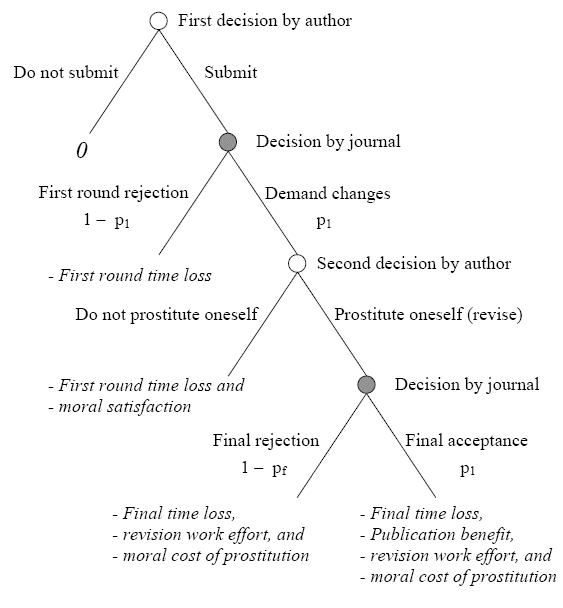Ekkehart Schlicht points to this article by Bruno Frey suggesting a change in journal review processes, so that the editorial board first decides whether to accept or reject a paper and then referees are brought in solely to suggest changes on accepted papers. Frey’s paper was published in 2003 and, according to Google Scholar, has been cited about 100 times, but I don’t know what effects it’s had. One journal I know with something close to Frey’s system is Statistica Sinica, which screens all submissions through the editorial board before sending out to reviewers. Another is Economic Inquiry, which accepts or rejects your paper as is, without going through a painful revision process. On the downside, Economic Inquiry charged $75 to submit an article, which was kind of irritating. Statistics journals don’t do that.
Frey’s article is thoughtful and entertaining but does not mention what seems to me to be the biggest advantage of his proposal, which is that it offers a huge reduction in the amount of labor put in by the referees! Frey quotes journal rejection rates of 95%. It would be a lot easier to get these referee reports if there were only 1/20th as many to chase down. When I write a referee report it usually takes about 15 minutes, but other people put more effort into each review, and it’s inefficient to waste their time.
I also don’t think Frey makes enough of the fact that editing and reviewing journal articles is volunteer work. Sure, there’s some prestige involved in editing a journal, and it also gives you some chance to influence the direction of the field, but my impression is these payoffs are low compared to the cost. (Rather than edit a journal, I’ve chosen to edit a magazine–that is, to blog–which is similar in many ways but gives me the freedom to focus on the topics that interest me rather than on whatever happens to be submitted. (Regular readers know that I often do react to “submissions”–that is, things that people email me–but I don’t have to.)
Beyond this, I agree with Frey’s general point that, when you write a book, you’re writing for the reader, whereas when you write a journal article, you’re writing for the referees. Econ journals are particularly bad, in my experience. It’s just a different style. In statistics or political science, someone might publish 5 or 10 major papers in a year. In economics (maybe also in psychology?), people work over and over again on a single paper, trying for that elusive “home run.” I don’t know that either approach is better, but I find it difficult to switch from one to the other.
Frey also points out that as researchers get older, they’re less inclined to spend the time on the referee process, instead writing books or publishing in less-demanding journals or simply placing their articles on the web. Schlicht recommends something called RePEC, and Christian posts papers on Arxiv, something that I’ve found to be a pain in the ass because of the requirement that the article be in Latex. I certainly don’t plan to submit many articles to econ journals unless I have an economist collaborator who feels like dealing with the review process.
This is all very important to us because we work hard and, having done the work, we’d like others to follow our lead. It’s so frustrating to figure something out but then not be able to communicate our findings to others who might be interested.
P.S. Here’s Frey’s decision tree (which he calls the Journal Publication Game):

He forgot to include the cost of submitting the article to the econ journal in the first place.
P.P.S. In his article, Frey considers some economic models. That makes sense for him to do–he’s an economist. But I suspect that sociology would be a better fit here.
What happens when the authors, for whatever reason, cannot provide the suggested changes? Is the article still accepted? If yes, it seems like there would be little incentive for the authors to improve the paper. If no, it seems to be similar to the old way of doing things.
Interesting, especially the discussions about the editors' need to maintain the prestige of the journal (to balance against making comfortable academic careers for thier friends / former students)
Won't the increasing publish or perish pressures eventually wreck any journal system?
> little incentive for the authors to improve the paper
Most, I believe when something will end up forever in print, have more than enough incentive to improve
Keith
arXiv will accept docx/ooxml from Word 2007, or PDF from older versions. LaTeX is their first choice for format, but it isn't a requirement.
Andrew (or anybody else), in your experience, how do statistics journals compare to econometrics journals? Are econometrics journals also mostly like other economics journals in terms of their refreeing process?